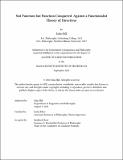Not Function but Function Conquered: Against a Functionalist Theory of Directives
Author(s)
Hill, John
DownloadThesis PDF (433.0Kb)
Advisor
Khoo, Justin
Terms of use
Metadata
Show full item recordAbstract
Ordering, requesting, and inviting are examples of directive speech acts. Philosophers have offered different accounts of what it is to perform a directive, which they have developed using different theoretical resources. Attitudinal theories of speech acts try to explain what it is to perform a directive in terms of a speaker’s beliefs, desires, and intentions. Nonattitudinal theories of speech acts try to explain directives in terms of something else.
This thesis is concerned with functionalism, a nonattitudinal theory of speech acts. According to functionalism, performing a directive is making an utterance with the etiological function of causing hearers to act in response to one’s utterance. I argue that functionalism is false. I develop counterexamples that show functionalism is too permissive about the kinds of causation suitable for generating directives. I argue further that the most plausible way to address these counterexamples is to become more attitudinal: rather than be permissive, functionalism should hold that directives and hearers’ responses to them are caused by specific internal processes.
Date issued
2024-09Department
Massachusetts Institute of Technology. Department of Linguistics and PhilosophyPublisher
Massachusetts Institute of Technology